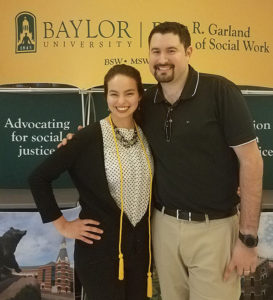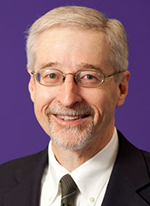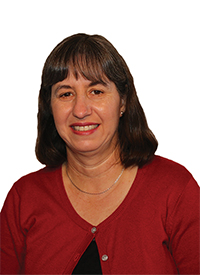WACO—Growing up in a church that allowed women to participate in business meetings only if their husbands were present, Janet Galarza never dared to imagine herself as a pastor.
“I remember my pastor then would say, ‘Women are equal everywhere except here.’ And he would say that as he pointed at the pulpit,” Galarza said.

Even as she matured and became involved in ministry throughout college, she thought God’s calling in her life could only take her so far because she is female.
“I used to think the greatest thing would be to marry a pastor, but now what I think is God is calling me to be a pastor,” she said.
Galarza expects to graduate in May from Baylor University’s Truett Theological Seminary. Her professors at Truett and members of the church she attends now have helped her discover her potential and clarify her calling, she noted.
She points to a preaching class she took during her first semester at Truett as instrumental in confirming her sense of calling.
“The process can be painful, but once I got going, it also got better,” she said. “Now I see preaching as a work of art, and I analyze the sermons I hear because I know how they are prepared.”
As she nears graduation, Galarza preaches in churches whenever she gets an opportunity to do so. Those opportunities have also exposed her to the type of challenges other women in ministry have to face, she said. Just as she eventually understood God also calls women to preach, Galarza hopes she can help others learn the same lesson.
“People can have a lot of influence in others,” Galarza said. “In many ways, others have helped to shape my path, but now I see that even if others don’t see my calling, I will still serve. … This is all because God has called. I wasn’t a second choice, because it is God who wants to use me.”
Scriptural support for women in ministry
Both Truett Seminary and Hardin-Simmons University’s Logsdon Seminary affirm women like Janet Galarza who feel called to ministry because their leaders see clear examples of women in key roles in Scripture.
Hannah in 1 Samuel, Huldah in 2 Kings and Rahab in Joshua are just a few of the Old Testament examples of women God used, said Bob Ellis, dean of Logsdon Seminary and Phillips Professor of Old Testament and Hebrew at Logsdon.

In the New Testament, women served with Jesus and were leaders in the early church, said Todd Still, dean of Truett Seminary and professor of New Testament and Greek at Truett.
In Luke 8, women are mentioned among those who traveled with Jesus and supported his ministry, Still said. Mary Magdalene was an apostle to the apostles, telling them about the Resurrection of Christ, and the Apostle Paul referred to Phoebe as a deacon, he noted.
Since both the Old Testament and New Testament show women in leadership roles, then “we should conclude that Paul’s instruction for women to be silent in church—1 Corinthians 14—and prohibiting women from teaching—1 Timothy 2—were instructions for specific contexts,” Ellis said. “The restrictiveness of the broader culture may have led the early church to view such limitations as necessary for the sake of the gospel. We do not conclude such restrictions are universally applicable.”

Biblical passages that speak of women in ministry and leadership must at least open the door to have conversations about difficult or unclear texts, Ellis added.
“God is calling women to all sorts of ministry roles today,” Ellis said. “In response to the moving of the Holy Spirit, we affirm women whom God calls and help prepare them for service.”
While it is correct to say women serving in the pastorate in Baptist churches is “not traditional,” it’s difficult to make the case it is “not biblical,” Still noted.
“If you get all the texts on the table, then you can trace a trajectory that is far more inclusive of women in ministry,” he said.
It is important to be charitable with Christians who hold different opinions, Still said. However, the conversation is more than a theoretical issue for women who have been called into ministry, he noted.
“It is a matter that bears upon their sense of vocation and impacts their spiritual well-being,” he said.
Places to serve
Truett Seminary has a commitment for its students to find places to serve, Still said. He noted
75 percent of female graduates in 2017 were able to find ministry jobs within three months of graduation. That percentage increased to 88 percent this year.
“It is both our joy and responsibility to seek placement for our graduates,” Still said. “Frequently, we are able to work with our Texas Baptist church family to find suitable ministry placement for our graduates.”
In recent years, Logsdon Seminary has averaged 85 percent to 90 percent placement of all graduates in ministry, Ellis noted. Of the women who graduated in the last academic year, 89 percent found placement in ministry positions—including Christian counseling, student ministry, university ministry and the pastorate—either before graduation or within a few months of completing their degrees, he added.
Women make up about 35 percent of the students enrolled at Truett and Logsdon. However, Hispanic women constitute a much smaller proportion—2 percent at Truett and about 6 percent at Logsdon. Of the 1,398 students who graduated from Truett from 1996 to 2017, 444 were women, and 28 of those women were Hispanic. In 2018, 50 percent of the master’s level students at Logsdon were Anglo and 50 percent were persons of color.
Christian Latina Leadership Institute

To help provide additional resources to encourage and equip Hispanic Christian women, Nora Lozano led in the creation of the Christian Latina Leadership Institute.
Lozano joined the faculty of Baptist University of the Américas in 2000. Not long after that, she envisioned a resource “to identify, develop and nurture Latina leaders who could serve in both churches and communities.”
Lozano is a professor of theological studies at BUA, as well as the director of the institute, housed at the university in San Antonio. The Christian Latina Leadership Institute offers a three-year certificate program, with each year focusing on different aspects of leadership. Some college course credit is available.
Many of the institute’s students face challenges from the moment they set foot in the classroom, because they lack support from those around them, she noted. While that is true of students preparing for secular careers, it is magnified for women who feel called to ministry.
In addition to encouraging Hispanic churches to examine and interpret the Scripture regarding the role of women in ministry, Lozano also encourages congregations to “hear the stories of women engaging in ministry throughout church history, as well as today.”















We seek to connect God’s story and God’s people around the world. To learn more about God’s story, click here.
Send comments and feedback to Eric Black, our editor. For comments to be published, please specify “letter to the editor.” Maximum length for publication is 300 words.